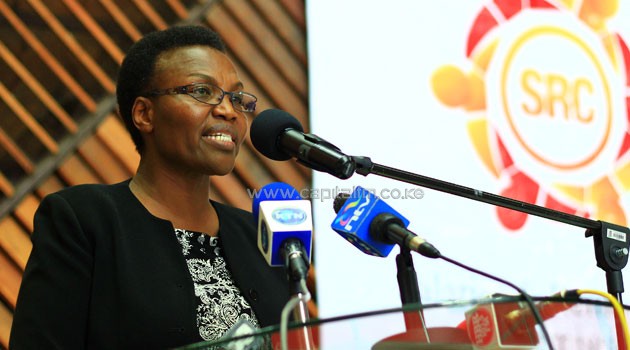NAIROBI, Kenya, Nov 11 – The Salaries and Remunerations Commission (SRC) on Friday launched job evaluation results for the public sector reviewing salaries for public servants through the adoption of a new grading structure.
The report which comes 17 months after the launch of a job evaluation programme by President Uhuru Kenyatta in June last year, focused on the minimum wage, compression ratio, sustainability of the wage bill and fairness and equity for salaries of 40,298 public officer’s jobs across 228 public institutions.
According to SRC’s Chief Executive Officer, Ann Gitau, the commission through the evaluation has aspired to reduce salary disparities from a compression ratio of 1:58 to a ratio of 1:10.
“Prior to the commission developing the state officers’ remuneration pay, the compression ratio was 1:58 and after we did a job evaluation and developed a remuneration structure, the commission reduced the compression ratio to 1:10,” stated Gitau.
The job evaluation results, developed using the Paterson philosophy’s band which identifies five cadres in the grading structure; from top executives who make strategic decisions to semi-skilled workers who make basic decisions, made key findings on the distribution of the workforce in the public service and recommended clearer job descriptions to improve on efficiency in the sector.
“The public service has had an ad hoc frameworks of remuneration structure,” said Gitau, adding that, “Creating a reference point for upon which jobs in the public sector shall be looked at will help in proper management of the workforce and stabilisation of the public wage bill.”
Among the ministries in the national government, the results indicate that four out of every ten jobs fell in the middle cadre of the grading structure which includes supervisors and highly skilled workers who make tactical and specialised decisions.
“The good news is that we now have a study that gives as evidence on equal pay for equal jobs,” observed Public Service Commission Chairperson Margret Kobia who noted that getting the equation of job distribution in the sector right will help improve service delivery in the public service.
Of the 3,010 jobs evaluated across 21 ministries, there were less than one per cent jobs in the top level of the grading structure which entails workers who make strategic decisions.
Senior, middle management and supervision jointly accounted for 76 per cent of job distribution across the five levels of grading. The same scenario played out in the 47 counties where only one percent of jobs went to the top category, 78 per cent of the workforce were mainly concentrated in the senior, middle management and supervision positions.
Among the teachers, the largest group of the workforce was found to be in Job Group G which made up about 30 per cent of the total workforce employed by the Teachers Service Commission (TSC).
According to SRC’s chairperson Sarah Serem, the job evaluation exercise addresses pertinent issues that affected the morale most public servant who often took to the streets in protests over poor remunerations.
“The entire wage bill was untenable – it was a source of low morale and dissatisfaction among the public servants and a major contributor to poor service delivery and frequent industrial unrests,” Serem said.
Serem noted that harmonisation of pay in the sector through measuring the worthy of every job will reduce disparities and ultimately tame confrontations between employers and workers unions which have in most cases cited unfair compensation of their labour compared to their counterparts in other job groups in other government institutions.
Speaking during the launch of the evaluation results, the Chief of Staff and Head of Public Service Joseph Kinywa commended the efforts made by the commission saying despite the frequent contestations which resulted to the commission being taken to court over allegation of overstepping on its mandate.
“The commission has been faced with challenges including being taken to court but they’ve stood firm,” said Kinywa. “ The close cooperation we have witnessed during this exercise is an example of how much we can benefit if we all work in harmony,” he said.
The launch was also attended by Lillian Amolo – the Permanent Secretary in the ministry of Public Service, Youth and Gender and Teachers Service Commission chairperson Lydia Nzomo.
The new grading structure is set to take effect from the financial 2017/18.











































